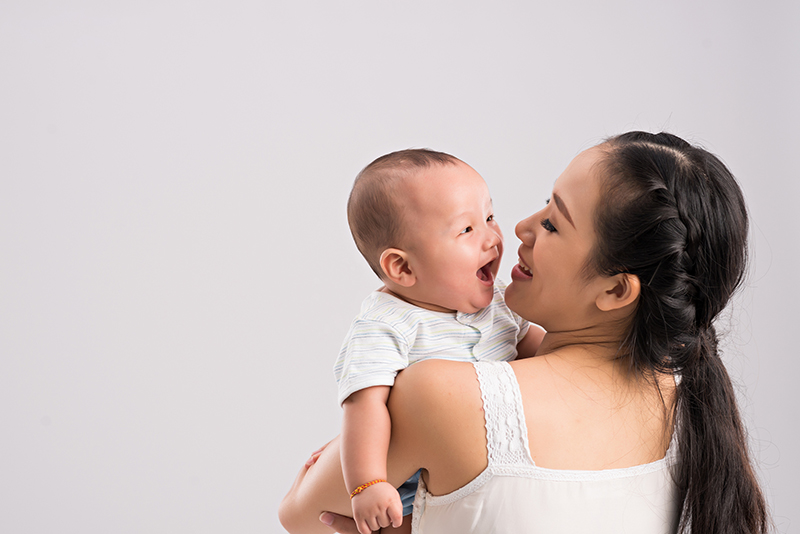Families For Life | Connecting with Your Baby

What happens in a baby’s everyday life affects the way the brain develops. By connecting and bonding with your baby, and giving your baby lots of love, attention and interesting experiences, you create the best conditions for your baby’s brain growth, learning and development.
Connecting and bonding with your baby: why it’s important
Babyhood – it’s a time of face-pulling, baby talk (or parentese) and smiling. Babies spend their days looking at faces, watching parents and siblings, and refining emotional skills. This is the way they get the love, attention and stimulation they need to develop and feel safe in the world.
Understanding your baby: 2-6 months
During this time, your baby begins to learn what emotions are and what they’re for.
By watching how you react when she expresses emotions, and by seeing you express your own feelings, your baby starts to know when she feels specific things, such as happiness, sadness, excitement or fearfulness.
After about three months, babies also begin to learn that certain actions – such as smiling, cooing, crying or suddenly yelling louder than the television – can bring about emotional responses from grown-ups.
Tips to help you connect with baby
When your baby first starts to deliberately catch your eye, look back into baby’s eyes.
When baby makes noises, show you’re listening. Try smiling, nodding, widening your eyes, lifting your brows and touching. You can also say things like, ‘What did you say?’ or ‘Aren’t you talking well!’ This all encourages your baby to keep communicating.
Help your baby to calm down after any emotional excitement. You can do this by stroking baby, saying gentle words and playing soothing music. This all helps baby to develop emotional control.
Maintain a regular routine. This helps your baby to feel comfortable and make sense of all the new sights, sounds, smells and tastes around.
Researchers believe that seeing the way your face reacts when your baby does or says something helps baby to understand the world and form relationships.
Understanding your baby: 6-9 months
This is a period of rapid development and brain growth. By nine months, your baby’s brain has undergone a growth spurt that helps form connections between what he sees, hears, tastes and feels.
At this age your baby is increasingly independent and has improved motor skills. She can sit by herself for short periods and might start crawling. As she begins to understand who she is, her memory improves too. You’ll find she starts to form attachments to people and objects.
Separation anxiety often comes with attachment. To cope with this, your baby needs to learn that when things disappear, they also reappear. You can help baby by:
giving lots of physical affection, cuddly toys and verbal reminders of where you are as you move around a room
playing fun games, such as peekaboo – these also give baby the experience of taking turns
encouraging time with other caregivers – this might also give you the chance to go out occasionally and leave baby in somebody else’s care.
As your baby moves closer to 12 months, he’ll become increasingly vocal. When baby begins to make sounds – ‘ba ba ba’, ‘da da da’ – repeat them back. Repetition in speech – ‘Are you hungry?’ ‘You’re hungry aren’t you?’ ‘Ohhh, I’m hungry’ – teaches babies the meaning of words and leads to the development of speech and language.
It’s never too early to start talking to your baby. Hearing lots of words helps your child’s intellectual development later on.
Understanding your baby: 9-12 months
By this age, your baby’s ability to experience different emotions and moods has developed considerably. Baby is also learning how to recognise when other people have emotions.
If you respond to emotional expressions, it helps your baby to identify emotions and understand the process of feeling better and worse. For example, ‘Yes, I know you’re cranky, I’m coming back soon’.
As the front part of the brain develops, babies at this age are better able to entertain and reassure themselves with familiar objects and people. They can move more and better, which means they can get away from things that upset or annoy them. You might find that your baby is also starting to want more independence!
Keep baby involved and alert by:
doing things that make baby happy
changing activities when boredom or stress sets in
trying play ideas like reading books, playing with toys and walking around the park pointing at things.
Research tells us that parents who talk about emotions with their babies help their children to understand and respond to other people’s emotions.
Video: Connecting and communicating (0-6 months)
Watch this video and learn the importance of communicating with your baby, and how it helps her learn and develop.
Video: Connecting and communicating (7-17 months)
Watch this video and learn the importance of communicating with your baby, and how it helps her learn language.
© raisingchildren.net.au, translated and adapted with permission
Explore more